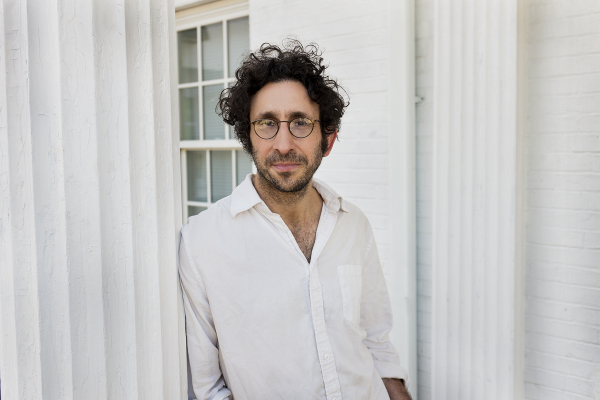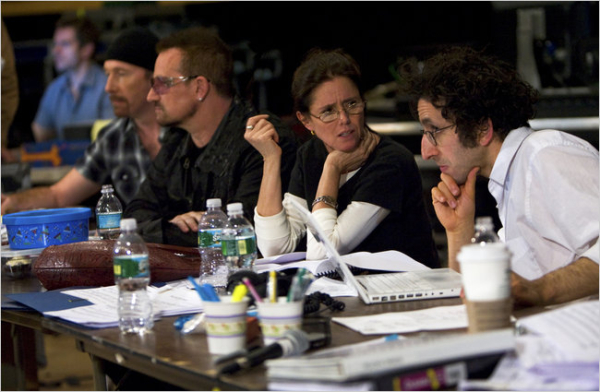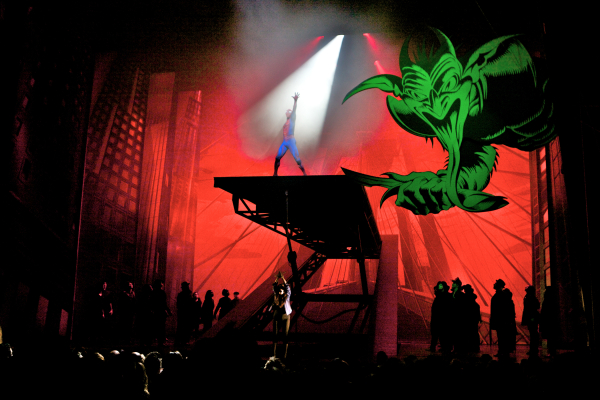Song of Glen Berger, Author of Broadway’s Spider-Man: Turn Off the Dark and the New Book Song of Spider-Man
Glen Berger wasn’t a household name until November 2010. It was at the end of that month that Spider-Man: Turn Off the Dark, a musical that he coauthored with Julie Taymor, Bono, and The Edge (and later, Roberto Aguirre-Sacasa), began performances at the Foxwoods Theatre.
The record-breaking period of 182 previews would see countless arguments among the collaborators, enough backstabbing to fill multiple revenge tragedies, highly publicized accidents (Natalie Mendoza, a concussion; Christopher Tierney, a 30-foot fall into the orchestra pit), a high-profile firing (Julie Taymor), and the creation of an entirely new version of the show in a matter of weeks (with new director Philip William McKinley and writer Aguirre-Sacasa).
For Berger, the recipient of two Daytime Emmy Awards for children’s television programs and the author of the dramas Underneath the Lintel and The Wooden Breeks, it was an experience fraught with worry, self-doubt, and eventually the loss of one very good friend and collaborator (Taymor).
Six years after he started the musical’s writing process, Berger is setting the record straight, in the form of a memoir entitled Song of Spider-Man: The Inside Story of the Most Controversial Musical in Broadway History. Recounting his experiences in significant detail, the book gives us an emotional look at the $65 million “rock-and-roll circus drama,” and how this little show that no one expected would even open — and has now played for three years and counting.
TheaterMania chatted with Berger about his Song of Spider-Man and how writing gave him a cathartic experience half-a-dozen years in the making.

(© Don Hamerman)
When was the last time you saw Spider-Man: Turn Off the Dark?
Oh, gosh. It’s been a while…Every single moment in the show is fraught with so much weight and so many memories — every line — it’s not easy to watch. Sometimes it’s just on a personal level, not on any artistic level. It’s definitely been half a year now.
You talk in the book about how no one expected it to last past 2011, and here we are at the end of 2013.
There was definitely many a moment where I was right there with everybody else, thinking that if something doesn’t change this thing is really going to end. I remember making a vow to myself in February of 2011. I remember thinking, If you make it to June 2011, you’ll live. If you make it to September of 2011, [you’ll] be content, still, with [your] life. And if the show [makes] it to 2012, [I will] never complain about anything in my life ever again. [laughs] It’s miraculous that it did make it. Of course, I’ve complained about all sorts of things since then.
Had you contemplated writing a book about your experiences during the fraught process?
It hadn’t once crossed my mind in any serious way. After opening night and the dust settled a little bit, my agents, who’d been kept apprised of all the doings throughout, said, “Glen, you should really think about maybe writing a book about it.” I said, “No, no, no — there’s no way.” But the more I thought about it, the story was just so fascinating. I felt like there was the opportunity to write something that wasn’t just a quote-unquote “tell-all.” That actually, the story [of what] happened had things in it that have been fascinations of mine throughout my whole fiction-writing career. I thought, Wow, okay, maybe I was meant to write this thing. One of the reasons for writing it was to see if I could chew over everything and get a little bit of catharsis out of it.
Tell me how you went about putting the book together. Based solely on the amount of minute details you have, I’d bet you had kept a journal.
I’ve kept a journal ever since I was twenty-one. The last six years I’ve really lapsed. I actually didn’t have a lot of notes that I wish [I’d] had. But there were a whole lot of e-mails and I was able to reconstruct and recall more than I was expecting — it all kind of came flooding back. I was privy to pretty much all the materials about the show as we were working on it. There were piles and piles of this stuff; transcripts of discussions that Bono, Edge, and Julie had in all these different places. I had the actual recordings of these daylong conversations that we would have, too. Those all got taped. I went through them all again with the hindsight of sometimes five years. So I was able to, more than I thought at first, reconstruct how things unfolded.
Did you have any out-of-body experiences at your computer?
Obviously, yeah. [laughs] As I was writing it, I found myself getting emotionally involved with the story all over again. I was feeling beat up at the end of the day. To make a character that is me did feel very strange. There were definitely moments, seated at my desk, where I’m shouting at my character, “Do this, don’t do that!” It felt strange watching myself walk into these predestined situations.

(© Joan Marcus)
During the whole process of working on the show, did it ever hit you that, “Wow, I’m working with superstars?”‘
Bono and Edge and Julie, they were so much about the work that you did often lose sight of— you forgot…until you end up at one of their concerts and there are twenty thousand folks they’re singing to. You lapse into forgetting and then you get these crazy reminders that these guys are the top of the game.
When was the last time you heard from them?
Julie called [recently] for the first time in a couple of years and we did talk for a few hours. That was wild. Bono and Edge, we kept in touch for a couple of years after the opening, talking about the show and what else [could] be done with it. There was a bit of a silent period during the whole lawsuit for various legal reasons. Although I did let them know I was writing a book.
Why?
[When we worked together], it was basically with the understanding that I wouldn’t splash this everywhere; it was an unstated understanding. I wanted to let them know, because at the same time, they acknowledge that it’s quite a story, and [one] that, if told correctly, would do nothing more than shed light. Elucidate.
Have they read it?
They read the book and signed off on it.
Has Julie read it?
I don’t know. I know she was interested, but she’s very busy now with Midsummer.
Did you reach the catharsis you were hoping for?
I was hoping for some breakdown in tears; one moment where I would feel absolutely, perfectly cleansed afterward. But it’s been just this sort of low fluffing-off of that. If you took a six-year period of your life and just dissected the hell out of it, you would feel a little more enlightened at the end of it.
What are you working on now?
There’s a film that Warner Brothers put out a few years ago, [August Rush]; I’m writing the book to turn that into a Broadway show. There are commissions from Berkeley Rep and the Alley Theatre…I look at these plays I started [writing] before [Spider-Man] and the themes are the same: humans working together toward some idealistic goal and helping to navigate one another’s humanity.

(© Jacob Cohl)











